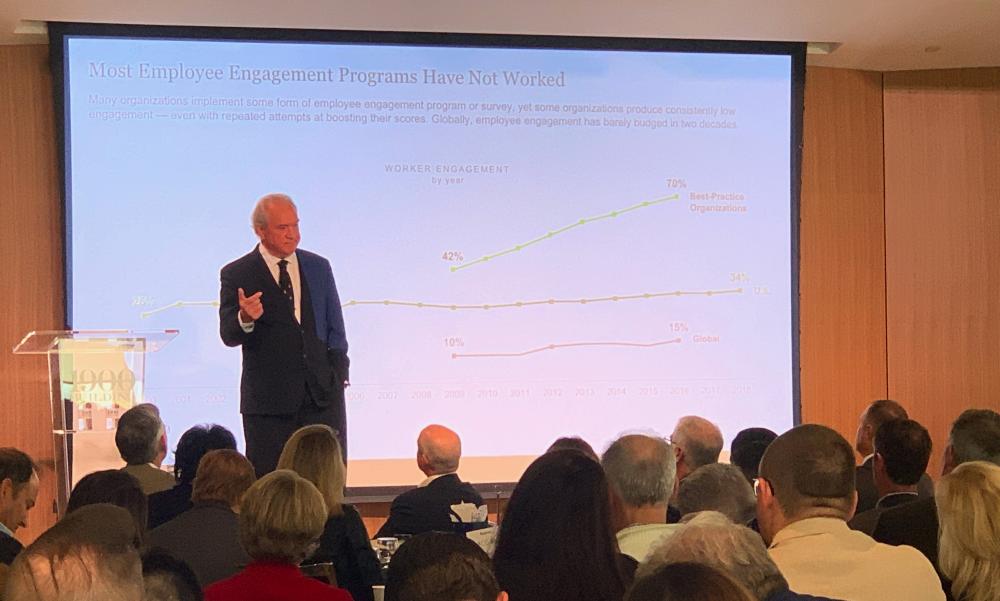
Jim Clifton, chairman and CEO of Gallup, spoke on November 8 to a full house at a joint meeting of ACG KC and NACD Heartland Chapter.

The retirement of Baby Boomers and the growing number of young Millenials and Gen Z individuals entering the work world should be changing the way companies are run, said Jim Clifton, chairman and CEO of Gallup. Clifton spoke on November 8 to a full house at a joint meeting of ACG KC and NACD Heartland Chapter entitled, “How Employee Engagement Drives Real Organic Growth.”
Clifton said engaging employees in ways they want is important for many reasons, not the least of which is cost-savings. “Between $483 billion and $605 billion is the annual cost of disengaged employees.”
How to stem the tide? Years ago a good paycheck was enough to keep an employee coming to work and being productive. But younger workers want more. They are looking for “more purpose,” Clifton said.
Gallup’s research shows what is changing in the way employees approach jobs. A generation ago, employees valued a paycheck. Today, they are looking for a bigger purpose. They wanted to be satisfied in their jobs; today, they want developmental opportunities. They aren’t living to work, but working to live. They want work-life balance.
Clifton emphasized the importance of defining people’s strengths and weaknesses and playing to them.
“Every strength has a strategy that can make it useful,” he said. The trick is figuring out what an individual’s strong spots are and using them to the company’s advantage.
Company leaders need to learn to engage employees in a more consultative, less authoritarian manner. Step one? Ditch the annual review process, Clifton said.
“You need to move to having ongoing conversations,” he said. “If you aren’t having one meaningful conversation with each of your employees each week, you are just keeping track of them.”
Gallup has used its Culture Asset Index (CAI) to great success with a many companies, big and small, to determine what employees are thinking about their jobs and the companies themselves.
The questions on the survey cover topics such as:
- Ethics and compliance (can employees speak truth to power)
- Diversity and inclusion (are employees treated with respect)
- Leadership and trust (employees trust company leaders)
- Leadership and inspiration (company leadership makes employees enthusiastic about the future)
- Disruption (the company has the speed and agility to meet customers need for change)
- Employee engagement and performance management
Clifton said the changing workforce means companies have to be willing to change, as well.
“Be intentional about finding managers,” he said. “Don’t just use experience or longevity as a gauge. It’s not hard to figure out who has natural leading abilities.”
“(They also) need to come to grips with people working from home. Mad Men offices are going away. You have to be flexible.”

Register by January 14 to lock in the lowest rate and join 3,200+ dealmakers in Las Vegas on April 27-29, 2026.
